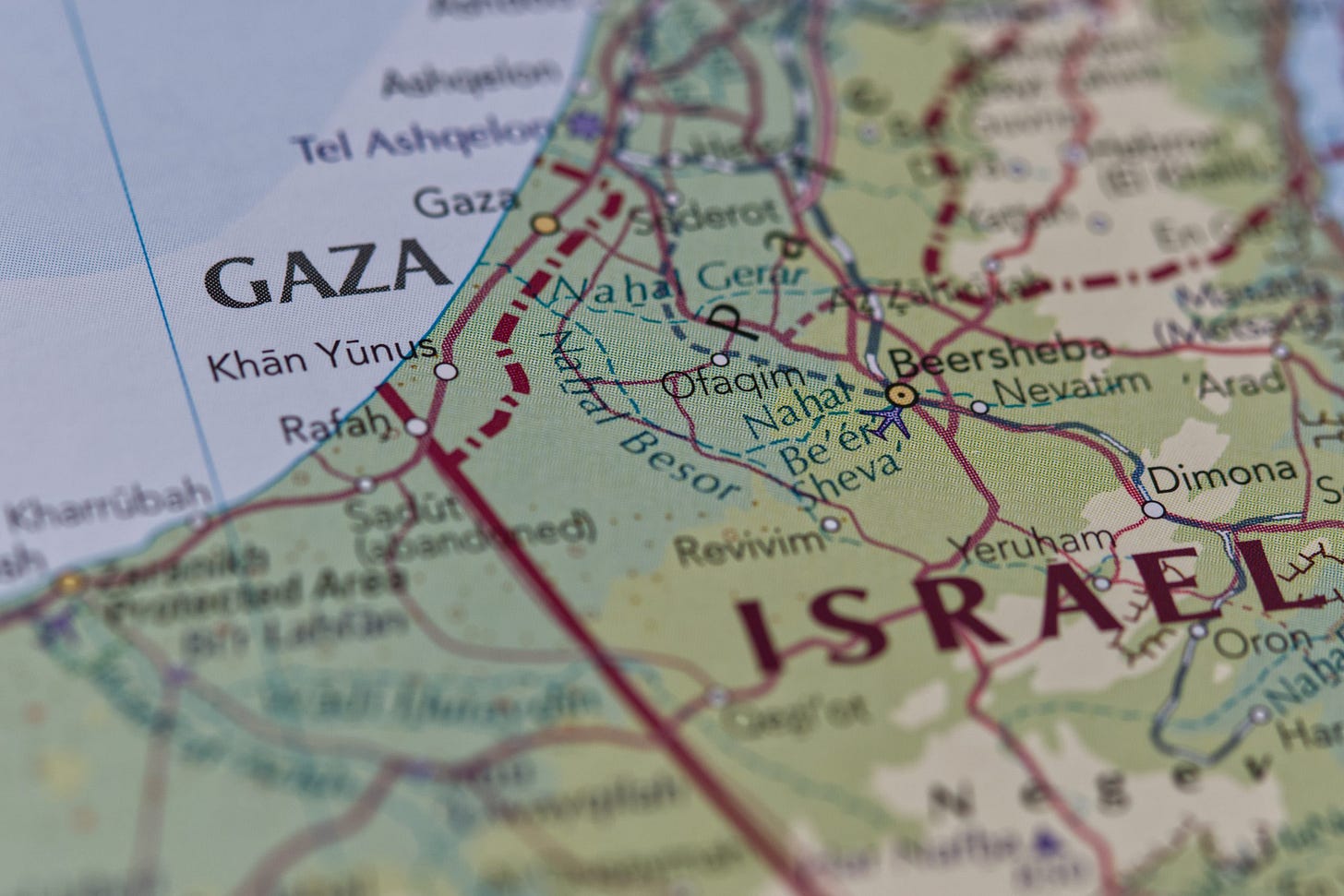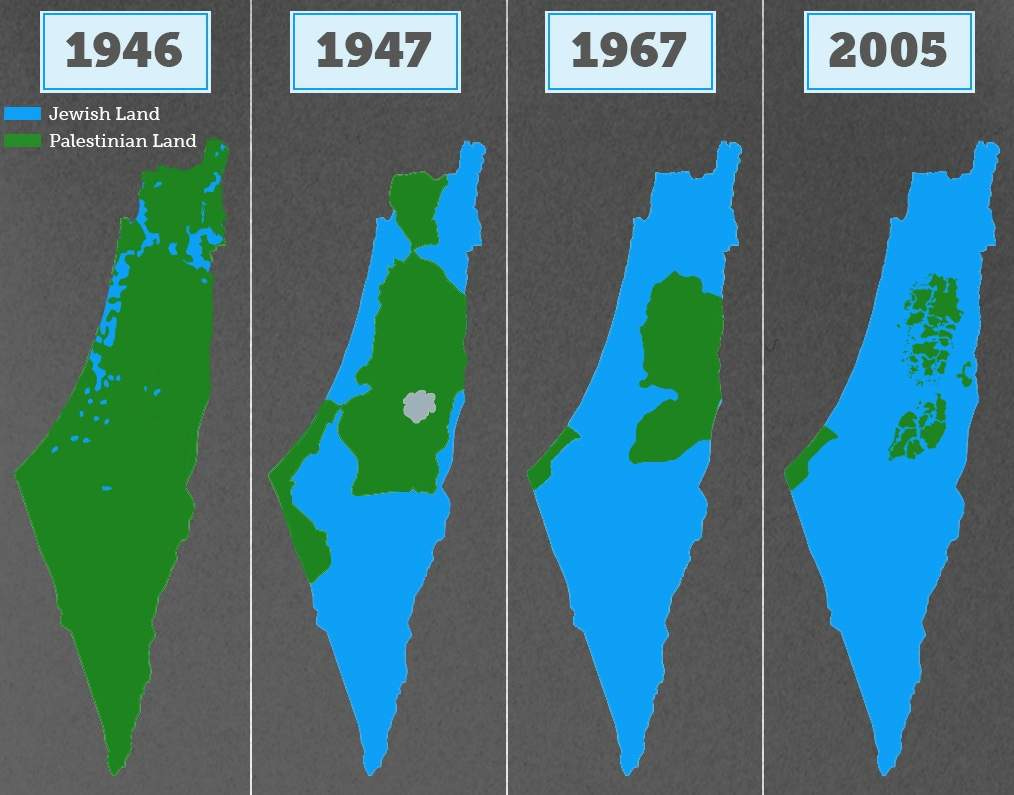Is History Really Written by the Victors? Facing Our Moral Anxiety over Israel-Palestine Conflict
It’s sad. What’s going on in the Middle East. That little boy with a red shirt and brown shorts whose limp body is being pulled from the rubble is someone’s son. That aged woman, her scarf now serving as her shroud, is somebody’s grandmother. He‘s the next great concert pianist who we will never know. Lost with her is the wisdom of a neighborhood. I’d like to lash out and blame religion which has caused a great many wars in the history of the world. But then I’d just fall into the negative cycle of war myself. Is it possible to be empathetic and also clear and rational and still believe in a peaceful future for the “Holy” Land?
I’ve been avoiding writing about current politics. For two reasons: I’m not a trained political pundit, and most political news is superficial. Give it a week or two, and we’ll no longer be talking about it. But this is different. I‘m getting lots of calls and texts from friends and family about this newest outbreak of violence between the Israelis and the Palestinians. It is cutting deep into our lives. We are witnessing some absolutely horrible images that are very difficult to look at.
If we choose to look away, that’s ok. We need to take care of ourselves as well.
In the past couple weeks several major earthquakes in Afghanistan have killed two thousand people. And yet we’re already forgetting about it, those of us who haven’t been there to experience it or working for charities to alleviate the suffering. However, when humans kill each other like this, it’s different. When it’s an “Act of God,” we put it in a different category than an “Act of Man." The taboo against murder haunts us all. This is why I don’t think that good is relative to one culture, why I don’t take it seriously when folks say, “Good—according to whom or to which culture?" Good and evil are common to all cultures. Which makes this present crisis very troubling. It is difficult to say what and who is good and bad in the Middle-East conflict.
It is causing us all some moral anxiety. Haunted by the idea that might actually may be right, that good is determined merely by the powerful, we are unsure how to take sides. Must we take a side? These questions are worth talking about with each other.
The philosopher Emmanuel Kant’s word for moral anxiety was conscience. We all have it. And we feel the need to sort out the present conflict into some blacks and whites that we can live with. Firstly, I think we should be engaged in some extra self-care at this trying time. Whatever that means: some good dinners with friends, a trip to the beach, opening our best bottle of wine, laughter, putting on some peaceful music. In the face of this dark time, let’s call that friend we haven’t talked to in a while, let’s treat ourselves to the extraordinary beauty of life. We are not alone.
Working through this anxiety involves reflection, gathering facts, and finding meaningful questions. I thought I knew the history of the Israeli/Palestinian conflict, but this week has taught me much more. The conflict has become just a headline over the years. “They’re at it again." This week we have been confronted with more extreme violence. And we are all now sitting here in dread of mass destruction.
In the early 1960s, Martin Luther King, Jr. knew that he needed the friendship of President Lyndon Johnson if the country was going to get any civil rights legislation passed. This led King to avoid criticizing the Vietnam War around Johnson. As time passed and the war escalated, King began to feel like a hypocrite. How could he be completely silent about the violence in East Asia when he was a champion of the non-violent approach? According to his biography, he began to be increasingly uncomfortable about his initial decision not to speak out: “doubts gnawed at [his] conscience,” and he did “a lot of thinking” about the problem he faced (King, 1998).
Martin Luther King was being gnawed at by moral anxiety, a familiar unease that we experience in the face of a challenging situation. The value of this anxiety is that it shows us the importance of an issue, and it begins to guide us through the trouble.
Ultimately, in 1967, King did confront Johnson about the Vietnam War. “I speak out against [the war] not in anger but with anxiety and sorrow in my heart.”
As I seek to learn more about the Mideast conflict and attempt to find my own position, I’ve come to these basic questions.
1. What does terrorism mean today? How is the word being used for a speaker’s purposes on either side? Terrorism has come to signify something new since September 11th, since the American “War on Terror.” Back in the ‘70s and ‘80s, we called what the Irish Republican Army did, terrorism. But after 9/11, it came to stand specifically for Islamic Jihad against the West, and not only the West but the ideas of the West. We condemn terrorism, not because it is a people fighting against ideas, but for how they do it. They could fight back with their own better ideas, not with mass murder.
2.. Is Hamas committing acts of terror with this latest attack, or are they defending their homeland against a colonizer? Or is it both? We have come to see colonization—the thing Americans did in their genocide against the Native Americans to get more land—as morally unacceptable today. So who is the aggressor in the Middle East? And can Hamas be separated from “the Palestinians?" Where do they get their recruits? And if Hamas is different from the Palestinians, then is the Israeli government of Netanyahu different from the Israeli people?
I found the general Wikipedia article on Hamas helpful. Originally founded based on the idea that they would never accept Israel ’s right to exist, the organization changed its position a few years ago to accept the 1967 boundaries. Many say Hamas violently took over Gaza. It’s true. Then the group won elections in 2006.
Ehud Barak, the former Prime Minister of Israel, said a few days ago that this is Netanyahu’s fault. Not only has he been attempting to change the balance of power in Israel’s government which left the country vulnerable (Netanyahu is currently on trial for corruption), but he has also had a strategy of engaging with and emboldening Hamas in order to undermine the Palestinian Authority (PLA). He’s done this because when the PLA is weak, there is less international pressure to pursue a two-state solution. Netanyahu has been as much against a two-state solution as Hamas.
3. What is a just response by Israel? They have the right to defend their country. They have the right for their young people not to be murdered while attending a music festival. And here in the U.S., what is the right path for the Biden administration? By aligning so close to Israel, does Biden underscore or undermine his legacy?
4. Are the concepts of the “West” or the “(Middle) East” real? This is a good question for the Russian war in Ukraine. Let me ask you, is there an East and a West side of the Milky Way Galaxy? Are these terms being used merely to create a false sense of “us vs them?" Are not real values true everywhere in the world?
These are not easy questions. While we grapple with them, we need a Joan Rivers. After 9-11, she got her butt right back in the comedy clubs to give New York some laughs. She asked, for example, why we couldn't find Bin Laden. "The guy is suffering from kidney failure. He’s on dialysis,” she exclaimed on stage to hundreds. "And he’s out in the wide-open desert. All you have to do is find the one electric cord out there and unplug it!”
I loved Joan Rivers for attempting comedy after such a tragedy. Laughter puts us in touch with our own bodies, our own intuitive sense of any situation. Here’s Pete Davidson, the opening act for Saturday Night Live this past week. Pete lost his dad in a terrorist atack, and in this clip he tells of finding laughter as a seven year old boy soon after.
We could use some laughter and joy about now. When anyone in the world is suffering, we are suffering. It’s an open wound for all of us. To be human is to struggle and look for answers. And it may take a while. In the meantime, we can talk to one another about our anxiety and about the suffering we feel for the people on both sides. And there is no politically correct way of feeling. We must find our own way. If some see the Palestinians as the good guys—that’s ok. If others root for the Israelis, it’s understandable. Am I being morally relative here? No. These are young nations in an old land. Time will tell
Winston Churchill famously said that “history is written by the victors." This is baloney. I‘m surprised that he, of all people, would say this. The history of the Jewish people is one of the most-told stories of all time. Not many would say they’ve been the victors. History that’s worth reading is written by the morally astute.
Russia could pull out of Ukraine tomorrow and acknowledge them as the sovereign nation that they are. And there could be peace in the Middle East. The Israeli/Palestinian war has been going on longer than I’ve been alive. It could end if there was the will. History is still being written. Sadly, someone’s precious little boy, and a community’s grandmother will no longer be part of it.




